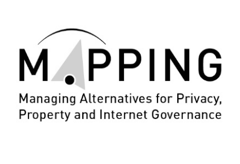Round Table on Open Innovation in the Proprietary World
[Update] View the recordings from the event: Welcome & Introductions | Keynote address | Session 1 | Session 2 | Second keynote address | Session 3 | Session 4 | Closing remarks | Full playlist
[Update] Report from the Open Innovation event: Open Data, Open Access, And Open Education – Key To Open Innovation?
[Update] IPR regime: a barrier to innovation? Read the report from the event for a summary of the discussions.
[Update] The photo gallery from the event is available.
[Update] Live tweeting: #theGIP
The MAPPING consortium, in collaboration with DiploFoundation as a consortium member, is holding a round table on Open Innovation in the Proprietary World. Join stakeholders in a reflection on the impact of the current EU IPR protection regime on innovation and economic growth and the future of Open Innovation in the proprietary world. Join us in Geneva or online.
Intellectual property (IP) is often protected by a time-limited monopoly on economic exploitation of exclusive rights. It is often alleged that business models based on such a traditional IP conceptualization can stifle scientific and technological progress, often leading to prohibitive practices and chilling effects on the economy and on innovation. Open Source (OS) software and Creative Commons (CC) licences have emerged as amongst the most acclaimed alternatives to hurdles created by the traditional business models. Although most open innovation endeavours offer both tangible and intangible benefits to participants, not all eschew the more traditional economic rewards. Many new companies have been built on such concepts.
Join representatives of the MAPPING consortium and other main stakeholders from around the world in a reflection on the impact of the current EU IPR protection regime on innovation and economic growth and the future of Open Innovation in the proprietary world.
We will tackle questions such as:
- Are Open Innovation approaches viable and competitive in today’s proprietary world?
- Can business models based on OS and CC concepts be sustainable?
- Does the future look bright for Open Knowledge initiatives?
- Can Open Innovation be a driver of economic development?
Participation
The event will take place on Thursday, 19th March, 2015, at DiploFoundation, WMO Building, 7bis, Avenue de la Paix, Geneva, Switzerland.
Round-table agenda & speakers
[Update] An updated conference agenda, including speakers’ bios, is available.
The round-table agenda is as follows:
|
8:45 – 9:15 |
Registration |
|
9:15 – 9:30 |
Welcome & Introductions |
|
9:30 – 10:30 |
Key-note address: Intellectual Property Rights: Incentivising Creativity or Stifling Innovation? |
|
10:30 – 10:45 |
Coffee break |
|
10:45 – 11:45
|
Session 1: IP policies today – failing to understand innovation? |
|
11:45 – 12:45
|
Session 2: Business models for the Free/Open Source movement |
|
12:45 – 13:30 |
Lunch |
|
13:30 – 14:30 |
Second key-note address: Innovation through Liberty |
|
14:30 – 15:15
|
Session 3: Open Data, Open Access and Open Education resources – key to Open Innovation |
|
15:15– 16:00
|
Session 4: Revenue-generating techniques for Open Knowledge organisations |
|
16:00 – 16.15 |
Coffee break |
|
16:15 – 17:00
|
Round-up: The future of Open Innovation in the proprietary world |
|full_html

